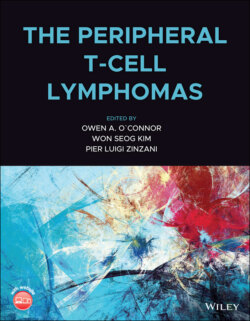Читать книгу The Peripheral T-Cell Lymphomas - Группа авторов - Страница 57
Extranodal Natural Killer/T‐cell Lymphoma
ОглавлениеThese rare lymphomas arise from NK/T cells and are typically divided into three different subtypes: ENKTL, aggressive NK‐cell leukemia (NKCL), and chronic lymphoproliferative disorder of NK cells.
Genome‐wide studies have shown that there is global hypermethylation in ENKTCL, and that several important genes including TP53, SHP1, and TP73 are affected. TP73 is a TP53 family member which may also be a negative regulator of NK‐cell activation. SHP1 regulates STAT3 activation and its loss may contribute to the aberrant activation of the JAK–STAT3 pathway. Other important genes that are inactivated by this are the proapoptotic BIM, DDX3X, and DAPK1. There is frequent methylation of ASNS, which encodes asparaginase synthetase and may explain the sensitivity of ENKTCL to L‐asparaginase therapy. Whole exome sequencing has described the mutational landscape of ENKTCL. Most frequent mutations involve DDX3X, which is also highly methylated. The mutants reduce RNA helicase activity but its role in pathogenesis is unclear. This study also confirmed the mutations in TP53 and STAT3 as well as mutations that affect epigenetic modifiers [83]. FAS is mutated or deleted in ENKTCL. There is upregulation of BCLXL and BCL2 through STAT3 or STAT5 activation which, together with the inactivation of BIM, may represent mechanisms of apoptosis resistance in ENKTCL. The interaction of the activated STAT3 pathway and the cytokine milieu promotes tumorigenesis. There are frequent mutations noted in STAT3 itself affecting the SH2 domain that prolong the activation of STAT3 even when cytokine concentrations are suboptimal. These mutations also lead to increased secretion of cytokines like IL‐10 and vascular endothelial growth factor, which promote the immunosuppressive tumor microenvironment. JAK3 mutations have also been noted in ENKTCL that drive STAT3 and can be inhibited by JAK inhibitors [83].
